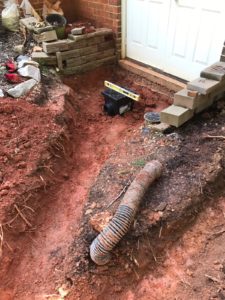Interior Basement Drain Systems –
What distinguishes an ordinary drain from an interior basement drain? While virtually every residence and business in the Greater Raleigh Area utilize’s plumbing system drains, not all of these structures include extensive interior basement drainage systems. These special systems assist property owners by performing a waterproofing role. Would your home or workplace benefit from the installation of a new interior drainage system? Three warning signs may reveal the need to this improvement.

Plumbing Systems And Interior Basement Drains
As a preliminary matter, it remains important to distinguish interior basement drainage systems from ordinary plumbing system drains. Most homes in this part of North Carolina possess a built-in plumbing system consisting of two main parts: water lines and sewer lines. Clean drinking water enters the residence and flows into taps located in kitchen sinks, bathtubs, laundry rooms, and other locations. After use, this water leaves the residence when it sinks through a drain. Typically, every drain connects to a pipe. The dirty water exiting through these channels will ultimately flow into a sewer system or a septic tank.
By contrast, interior basement drains seek to prevent water from pooling in the lower levels of the home. One big difference exists between plumbing system drains and interior basement drains: water flowing through the plumbing system enters the home with the permission of the homeowner. If you turn on a water tap, you anticipate a reliable flow of fresh, clean water. By contrast, water pooling in the basement resembles water seeping into a home through a leaky roof or a hole in the wall- no one welcomes its presence.
Three Indications Your Premises Might Require an Interior Basement Drainage System
While builders construct homes and commercial buildings with fully installed plumbing systems, they don’t always anticipate the need for an extensive interior basement drainage system. Also, property owners often add these home improvements when necessary as waterproofing measures intended to safeguard the lower levels of the premises. Water collecting in puddles in a basement may cause considerable damage. Interior basement drainage systems help prevent basement flooding.
If you’ve noticed any of these “warning signs”, you might discover benefits in requesting a waterproofing inspection. In some cases, constructing an interior basement drainage system might pose a smart solution:
One: The Basement Appears Chronically Damp
If you’ve become accustomed to a chronically damp, dank basement, consider requesting a waterproofing inspection soon! Basement locations should remain dry and comfortable. Also, water seeping through the walls or collecting in droplets on the ceiling indicates the presence of excessive moisture. If allowed to remain constantly wet, a basement all-too-frequently becomes a source of problems for the property owner. It may promote the spread of mildew and mold. Ultimately, a wet basement may even contribute to the development of structural problems.
Two: Your Home’s Sump Pump Sometimes Becomes Overwhelmed
Another warning sign of potential waterproofing issues happens when property owners notice sump pumps failing to prevent the collection of water in the lower levels of the home. Overwhelmed sump pumps signal waterproofing problems. If the sump pumps in the lower level of your home or business have stopped functioning effectively, these devices may require cleaning or replacement; yet in other cases, overwhelmed sump pump indicate the need for a more comprehensive interior basement drainage system.
Three: You’ve Experienced Seasonal Basement Flooding
Do you anticipate a wet, flooded basement during certain seasons of the year? We recommend seeking prompt waterproofing assistance! Additionally, property owners should not view a flooding basement as routine or normal. Take prompt action to request a waterproofing evaluation in this situation. Furthermore, in some cases, installing an interior basement drainage system offers an excellent solution to this type of problem because this action expands the basement’s infrastructure for draining away pooling water.
Why Waterproofing Inspections Help
During a waterproofing inspection, experts explore the issue of whether or not water leaks pose a problem in a residence or business. A waterproofing inspector also seeks to identify the most likely cause (or causes) for the excess water. If applicable, the homeowner can then consider possible ways to counter this problem. Frequently, a property owner decides to undertake a variety of measures to enhance waterproofing. The installation of an interior basement drainage system may pose one possible solution, for example.
Further Information
Does your home or business require the installation of an interior basement drainage system? Drainage & Waterproofing Solutions,LLC” assists customers across the Greater Raleigh, Fayetteville, and Southern Pines areas. Also, contact us to request a waterproofing inspection. We possess extensive experience installing drains, sump pumps, and other technologies to help customers enjoy dry, comfortable living, and working spaces. Contact us now at 919-235-5219 for fast, responsible assistance!
Additional Information
1. https://en.wikipedia.org/wiki/Plumbing
2. https://www.drainagenwaterproofing.com/basement-or-crawl-space-interior-drain-system/
